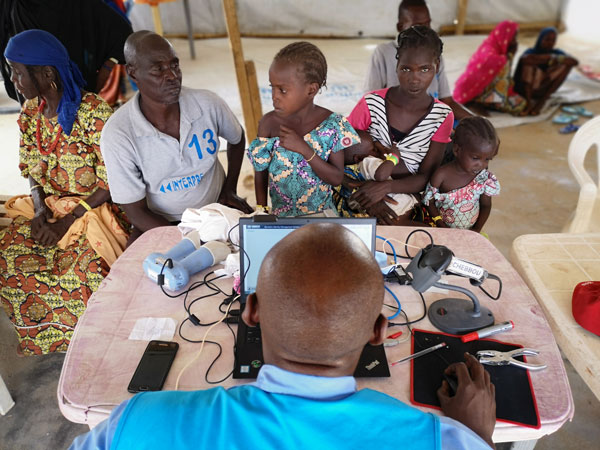In March 2019, a number of UNHCR staff in Cameroon were trained on how to use proGres v4, the latest iteration of UNHCR’s registration and case management software application. proGres v4 comes with new and enhanced functionalities to improve the way UNHCR protects, assists and ensures durable solutions for refugees..
By Berthe Biloa in Bertoua

UNHCR has been carrying out registration activities in the eastern and western parts of Cameroon, as well as in the Adamawa region where over 250,000 Central African refugees currently reside. Similar activities are also taking place in the most Northern part of the country where over 100,000 Nigerian nationals have sought safety from the violence instilled by Boko Haram.
To support UNHCR’s daily work with the screening and registration of new arrivals, staff are using proGres, UNHCR’s registration and case management software application.
A new version that facilitates registration procedures.
Roselyne Dzeukou Fokam has been leading on protection activities in the Bertoua office since 2018. She was previously part of the team carrying out the biometric enrolment of Central African refugees in Cameroon between 2017 and 2018 and therefore understands the importance of collecting refugees’ personal identity information in order to provide better protection and assistance to the people of concern to UNHCR.
“Registration and the issuance of documentation are crucial in ensuring the protection of those who have been forced to flee”, Roselynne explains. “We’re currently managing 386,467 individual cases in proGres v4”.
proGres v4 is one of the core tools of PRIMES, UNHCR’s Population Registry and Identity Management Ecosystem, which was established in 2017. PRIMES consists of a digital centralized repository containing all relevant identity information on refugees in one secure place. This greatly facilitates case management.
“The new version of proGres makes my work a lot easier as I can now access relevant data on refugees from anywhere in the country” Roselyne explains.
“For example, I can now access information about a refugee that was registered in another part of the country and follow up on their case from any other location. Previously, with proGres v3, we couldn’t do that. We would have to contact colleagues in the affected area and transfer the case to them for follow-up. This meant that we lost a lot of time and couldn’t follow-up and help refugees as quickly.”
The offline registration component of PRIMES, RApp (the Rapid Application), allows UNHCR teams to undertake registration and collect information in areas with low or no connectivity. Once connectivity is established, the information collected in RApp directly synchronizes and is stored in proGres v4.
These applications enhance UNHCR’s capacity in Cameroon to provide protection and assistance to refugees and other forcibly displaced populations.
Cameroon hereby joins the other 59 UNHCR operations already using PRIMES, providing a modern environment for conduction registration and case management of people who have been forced to flee. By 2020, we envision all UNHCR operations to be using proGres v4 and fully enjoy the benefits offered by the other PRIMES applications.
